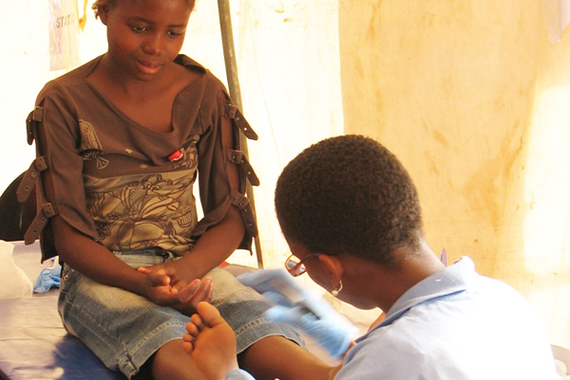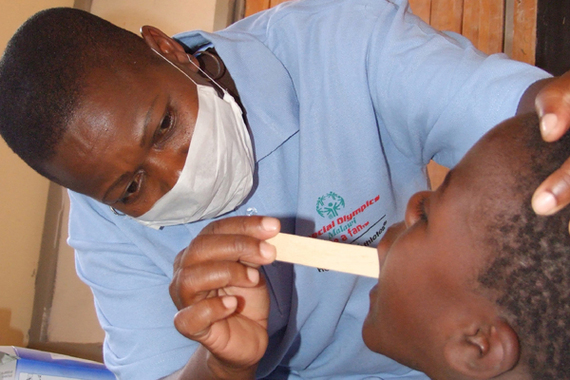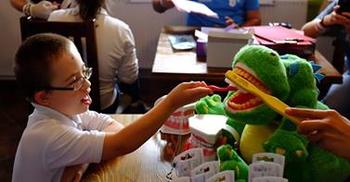"You can't compete if your feet hurt, if your teeth hurt or if your ears ache."
This quote from a Special Olympics athlete correctly sums up the motivation behind the Special Olympics Healthy Athletes Program.
Manuel Hofmann is a 24-year-old Special Olympics athlete from Germany. His mother Silke didn't know Manuel had a hearing problem until a volunteer doctor diagnosed Manuel's hearing impairment at a Special Olympics Healthy Athletes clinic. Manuel and Silke share their story in an effort to encourage people with intellectual disabilities to take more interest in their own health. Manuel received free Phonak hearing aids and follow-up care through the Special Olympics Healthy Hearing Program and the Hear the World Foundation. His life is now changed for the better.
"Sometimes I feel guilty as his mother that it took us so long to notice that Manuel had a hearing impairment," Silke says, "but he is also great at adapting and for a long time we thought that he was simply slow to grasp some things or that he just wasn't very good at expressing himself. Manuel now wears his hearing aid all the time, just like a pair of glasses and life is so much better for him." In Manuel's own words -- "Now things are much better than before. Now I finally understand."

Special Olympics is the world's largest public health organization dedicated to serving people with intellectual disabilities and maintains the largest database of health information in existence. People with intellectual disabilities have a 40 percent higher risk than the mainstream population of having secondary preventable health conditions, which is why the Healthy Athletes Program is so necessary.
The Healthy Athletes Program is responsible for: the training of more than 120,000 healthcare professionals in treating people with intellectual disabilities; 1.3 million free health screening clinics in 120 countries; more than 100,000 free pairs of eyeglasses provided to athletes.
The most moving aspect of the Healthy Athletes Program is that so many athletes screened did not know they had any health problems. World Health Day is an opportunity for us at Special Olympics to emphasis the urgency for a much greater understanding and an informed debate on the medical needs and challenges faced by people with intellectual disabilities and their families.
Zuebeyde Horus, a Special Olympics athlete from Turkey, also exemplifies the power of Special Olympics to transform lives. Like many people with an intellectual disability, Zuebeyde was living with a serious heart condition, but nobody was aware of it. A volunteer doctor discovered it by simply listening to her heart with a stethoscope at a Special Olympics Healthy Athlete event. Zuebeyde underwent life-saving surgery within days of being diagnosed. This type of defect is associated with intellectual disabilities and it is estimated that 45 percent of children with Down syndrome have some type of congenital heart disease.

Without the volunteer health care professionals who carry out these screenings, the Special Olympics Healthy Athletes Program would not exist and athletes like Manuel and Zuebeyde would not have been helped so today on World Health Day, Special Olympics athletes, families, coaches and staff, sincerely thank these extraordinary volunteers.
For more than 17 years, Special Olympics has been serving athletes by offering free health screenings and health information at local, regional and World Games and in many cases lives, limbs, eyesight and hearing have been saved. Health screenings are offered in seven areas: Fit Feet (podiatry), FUNfitness (physical therapy), Health Promotion (better health and well-being), Healthy Hearing (audiology), MedFest (sports physical exam) Opening Eyes (vision) and Special Smiles (dentistry).
The reality is that people with intellectual disabilities have more specialized health care needs and greater difficulty accessing health care services and health care professionals compared to the wider general public. A major study in the U.S. revealed that 80 percent of medical school students receive no clinical training in treating people with intellectual disabilities. Our own research analyzed this further and found that doctors have difficulty in diagnosing and prescribing treatment for people with intellectual disabilities for many reasons but poor bodily awareness and depressed pain responses are revealed as prominent factors.
The impact on many volunteer doctors and nurses after becoming involved in the Special Olympics Healthy Athletes Program is transformative. They drastically alter the way they work, teach and conduct research in order to be more inclusive of patients with intellectual disabilities. The power of Special Olympics is change -- the power to change lives for the better -- and health is a cornerstone of our programming and research.
A message from Mary Davis, Regional President of Special Olympics Europe Eurasia, on World Health Day about how the Special Olympics Healthy Athletes Program is saving lives of people with intellectual disabilities.
